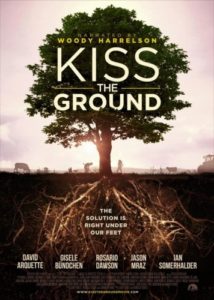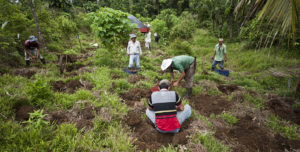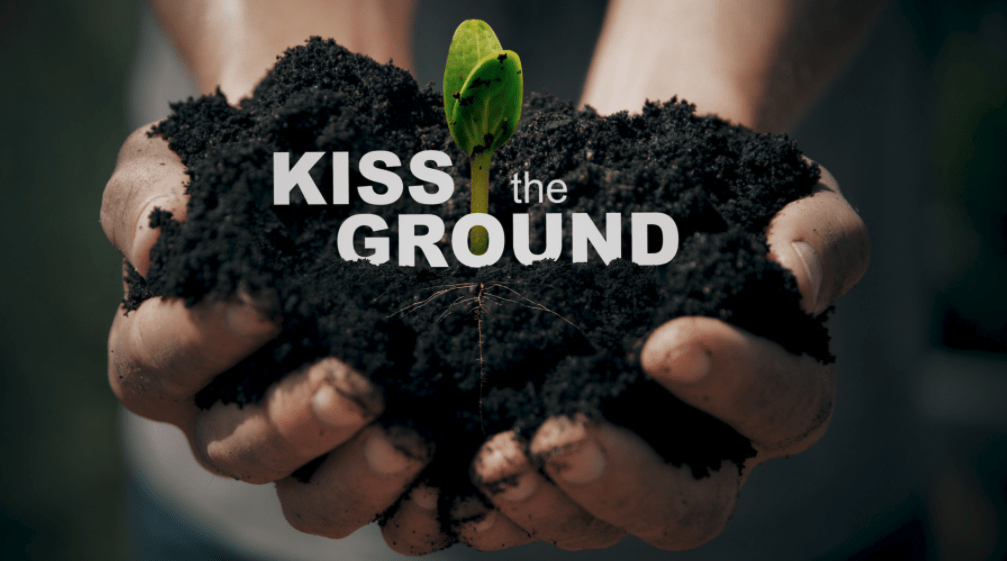A Review by SHP Director, Ann Armbrecht
 Kiss the Ground, an 84-minute documentary directed by Josh Tickell and Rebecca Tickell and narrated by Woody Harrelson, takes a detailed look at regenerative agriculture, a type of farming that has the potential to balance climate, replenish water supplies, and feed the world. The film will premiere on Netflix on September 22, 2020.
Kiss the Ground, an 84-minute documentary directed by Josh Tickell and Rebecca Tickell and narrated by Woody Harrelson, takes a detailed look at regenerative agriculture, a type of farming that has the potential to balance climate, replenish water supplies, and feed the world. The film will premiere on Netflix on September 22, 2020.
Based on the book Kiss the Ground: How the Food You Eat Can Reverse Climate Change, Heal Your Body & Ultimately Save Our World (Enliven Books/Atria, 2017) by Josh Tickell, the film balances sobering facts with inspiring accounts of individuals working to make a difference. The pacing is excellent, the footage engaging, and the overall message is powerful and clear.
Like many of this genre, the film moves from an account of how dire things are toward potential solutions. Innovative graphics make complex soil science clear and accessible and demonstrate how conventional farming practices deplete rather than replenish soil health, which leads to desertification and contributes to climate change. Five percent or fewer of farms practice regenerative soil management, according to the film, and many farmers do not know how soil works. With the decoupling of livestock and row crops from commercial agriculture, there is no ongoing soil fortification, hence the need for added inputs, especially nitrogen, to maintain soil health. The application of synthetic chemical fertilizers then masks underlying problems with the soil. Two hundred peer-reviewed studies reportedly connect these chemicals with attention-deficit/hyperactivity disorder (ADHD), various cancers, and more.
A Covered Planet is a Healthy Planet

Turmeric root production. Photo by Steven Foster.
Speaker after speaker, such as soil microbiologist Kristine Nichols, PhD, environmentalist Paul Hawken, activist Pashon Murray, and current governor of California Gavin Newsom, makes the point that these chemicals kill microbes in the soil, turning it into dirt. Unless we change our farming practices, we have a projected 60 annual harvests left. The ways we are feeding ourselves, in other words, is undermining our survival. Poor land leads to poor people, and poor people lead to social breakdown. These are all connected, and change, the film suggests, begins with feeding the soil to nurture living systems.
A covered planet is a healthy planet, a point made graphically clear with side-by-side images of fields where the soil is cared for and those where it is not. Equally powerful are before-and-after images taken in communities that committed to reversing the desertification of the soil.
Changing the microclimate can change the macroclimate by both rebuilding the health of the soil and helping sequester carbon. But it must be done to scale which, the film suggests, is a collective effort.
Every purchase people make is a choice: Are we regenerating the soil or are we degenerating it?
Are You Building Soil Health?
Though the film does not discuss herbal products specifically, the question above is just as relevant and important for the botanical industry and consumers. Are these herbs, which are grown to be used in health and wellness products, sourced from farms that managed the health of the soil?
In other words, what is the true cost of the herbal products we purchase for our personal health? Are our purchases building soil health, community health, and, ultimately, ecosystem health?
For those who want to learn more about resources on regenerative agriculture for the botanical industry, see Regenerative Farming (pages 27-30) in the SHP Sustainable and Regenerative Practices Toolkit.
The Power of Action
This film shows the power of individuals’ choosing to take action. To address the scale of the problem, all of us need to get involved, and Kiss the Ground’s accompanying website offers a robust and diverse “Take Action” section, including a Farmland Program that offers training and educational resources and technical support to help farmers and ranchers transition to regenerative agriculture. The website also includes a free downloadable middle school curriculum on the subject of healthy soil; a guide for purchasing produce, meat, dairy, soils, flowers, cosmetics, coffee, clothing, and other items that are good for the environment with explanations for why these choices matter; questions to ask farmers; and many other ways to make a difference.
I watched the film with my 16-year-old son, who has grown up with information about climate change and other dire news. Even so, Kiss the Ground — the animation, the facts shared (not just opinions, he said), the famous people (including singer-songwriter Jason Mraz and actors Rosario Dawson and Ian Somerhalder), the examples of what we can do to make a difference, even if we do not own a farm — all held his attention. He thought he knew a lot about the climate but, he said, he had not realized how important the soil is and what is at stake if we don’t keep it healthy.
More information on the documentary, including screenings, the trailer, and further reading, can be found at kissthegroundmovie.com. The film will premiere on Netflix on September 22, 2020.


Comments